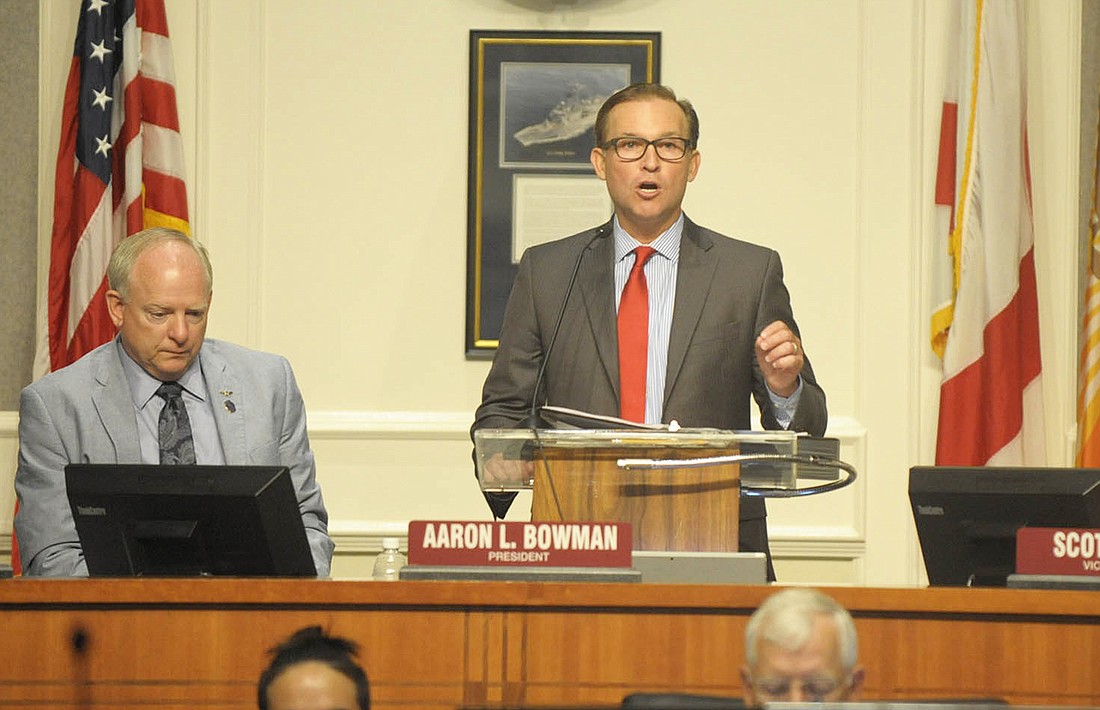
Mayor Lenny Curry isn’t raising taxes in 2018 and has no appetite to do so while he occupies the mayor’s office at City Hall.
His latest budget reflects as much, with City Council on Tuesday voting to keep the millage rate steady for the fifth year in a row.
For most Duval County property owners, $11.449 for every $1,000 of assessed property value goes to the city's operating budget. For the town of Baldwin, it’s 9.6312 mills and for the three Beaches communities, that rate is 8.1512 mills.
Millage rates haven’t gone up since the 2013-14 fiscal year.
Curry’s $1.2 billion budget presented to council members this week includes a $164.3 million Capital Improvement Program with yearslong commitments to improving UF Health Jacksonville, the Jacksonville Zoo and Gardens and other infrastructure needs.
It’s a much different scenario than the budget shortfalls the city faced less than a decade ago. Some of Jacksonville’s longest-serving council members remember the years when the Capital Improvement Program consisted of doing the minimum required annual infrastructure maintenance just to get by.
For his part, Curry praises pension reform for saving the city nearly $100 million in annual payments as a reason for the large CIP budget.
While tax rates are flat, tax revenue is up 7.7 percent from FY 2017-18 because of rising property values, a difference of about $46 million.
That may not be the case in 2019.
Among the 13 constitutional amendments voters will consider in November, Amendment 1 is likely to have a considerable effect on local municipalities, including Jacksonville.
The change would give property owners another $25,000 homestead exemption on taxes, other than those paid to local school boards, for a maximum exemption of $75,000.
Following Curry’s budget presentation to the council on Monday, Lori Boyer – the District 5 representative since 2011 – asked her colleagues to keep that in mind.
“I recognize the reality that this is an election year and I know there’s absolutely no appetite to offer a millage increase,” she said.
“On the other hand, I really am concerned of the impact of the potential additional homestead exemption on our city’s future,” she said. “This is big, it’s not just about next year’s budget.”
Boyer said she’s afraid that work accomplished through the last few budgets on infrastructure and other city priorities will be stifled if council members are not proactive.
“Even if you have substantial growth next year, that reduction of $27 million is going to be painful if that happens,” said Boyer, referring to the estimated loss in tax revenue for 2019.
Bill Gulliford, who represents the Beaches area in District 13, also expressed concern.
“The council of the future, which I’ll just be a critic of at that point, will have a tough decision to make,” he said.
“We suffered through the tough times where the revenue wasn’t there and we wanted to do some good things that we couldn’t do,” he said.
Gulliford and Boyer are termed out, leaving the legislative body in 2019 before the next budget is debated.
After the finance committee meeting Monday, Boyer provided more insight, saying “I know it’s not very Republican of me to say I want to raise taxes.
“I do believe you let taxpayers keep their own funds when we don’t need them,” she said.
Besides potentially scaling back capital improvement projects in the next budget, Boyer also hinted that council members would face “tough decisions” next year when considering cuts to operating expenses for city departments.
“The operating budget is where you have staff and oversight,” said Boyer. “Then you’re going to complain about inadequate oversight of projects and missing scheduled deadlines,” she said.
Boyer estimated the potential increase would be less than a half a mill for most Duval County property owners.
According to the Council Auditor’s Office, for the 2018-19 budget year, one mill equals about $57.56 million, with a quarter being around $14.39 million.
“I’m not talking about trying to gain on the market, just sustaining it,” she said.
For now, the city isn’t raising taxes, at least as it concerns the millage rate.
When asked if the city could have considered making a preemptive change this year, Boyer said that wasn’t necessary and likely wouldn’t receive support from most of her peers or the executive branch.
“Politically, I think in an election year you’re not going to see a bunch of people running for office vote to increase millage, especially when it’s not absolutely essential.”
Council President Aaron Bowman said he’s not worried about the potential loss in revenue next year, although he acknowledged it is something to watch.
“I’m expecting the homestead exemption to pass, so we might not be able to add as many things as we did this year but I don’t think it’s going to put us in an extreme position,” Bowman said.
Curry expressed similar optimism, saying the city “would do what it needed to do” if the challenge arises.
“We’re not raising taxes, period,” he said.